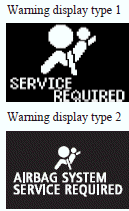SRS warning lamp/display
Warning lamp


If there is an error in the system, the warning lamp will come on and the warning display will appear on the information screen in the multi-information display.
Under normal conditions, the warning lamp comes on when the ignition switch is turned to the “ON” position and goes off a few seconds later.
The warning lamp will also come on and remain on when the SRS airbags and the seat belt pretensioner system have been activated.
The warning lamp/display is used for both SRS airbag warnings and seat belt pretensioner system warnings.
![]() Warning
Warning
► There may be a system error if the warning lamp/display appears as indicated.
In such cases, an SRS airbag or a seat belt pretensioner system may not function
properly in a collision. Have your vehicle checked by a MITSUBISHI MOTORS Authorized
Service Point.
• Even when the ignition switch is in the “ON” position, the warning lamp does not
come on or it remains on a few seconds later
• The warning lamp comes on while driving
• The warning display appears while driving
See also:
To install
Confirm that the head restraint is facing the correct direction, and then insert
it into the seatback while pressing the height adjusting knob (A) in the direction
indicated by the arrow.
Caut ...
Cancelling the alarm
It is possible to halt the activation of an alarm using the following methods:
• Pressing the LOCK or UNLOCK switch on the remote control switch.
(After pressing the LOCK switch, the vehicle will ...
Floor console box
Type 1
Upper and lower boxes are located inside the floor console box.
The floor console box can also be used as an armrest.
1- Upper box
2- Lower box
To open the upper box, lift the right rele ...
